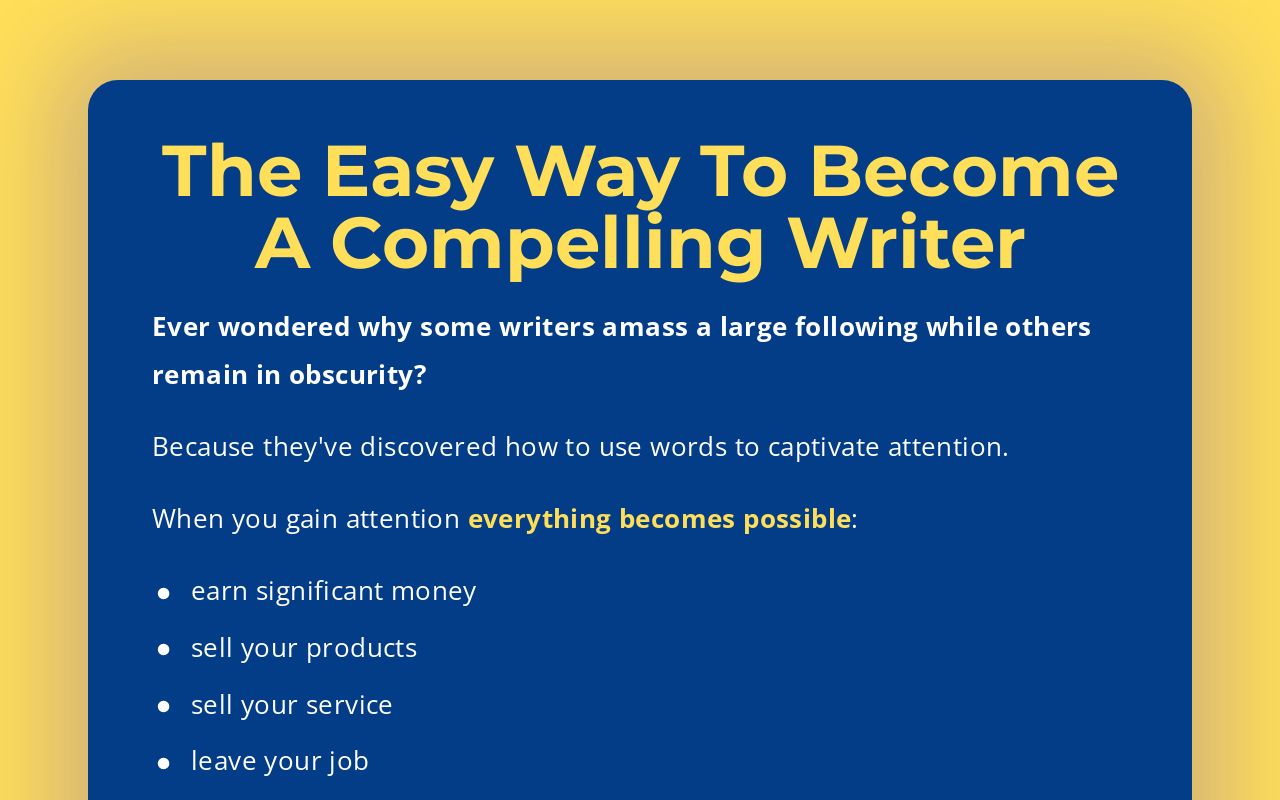- The Compelling Writer
- Posts
- You'll Get More Readers By Answering Their 4 Questions
You'll Get More Readers By Answering Their 4 Questions
How people decide whether to read your stuff
Welcome to part 2 of our series - how to get people to read your stuff.
Last week I shared how to get your writing in front of people.
Today I’ve got the next step for you. How to grab people’s attention so they stop to read your gems.
But this isn’t easy. There is so much screaming for people’s time.
And the only weapon you have is a single sentence:
Linkedin/X = the hook
Email = subject line
Medium = headline
Blog = title
One sentence carries all the responsibility. Unless it stops people in their tracks and seizes their attention. Your writing is wasted.
When someone spots your writing. They are in decision mode. They quickly ask 4 questions. You need to give 4 incredible answers.
Because if you do - you’ll be rewarded with their attention.
Here’s the 4 questions they ask:
What is this about?
Be clear on the topic.
Cryptic (& supposedly clever) headlines are unhelpful. Because if people are uncertain they’ll move on.
Avoid puns and wordplay. State your topic simply.
Tease and raise curiousity, without giving the answer away.
Notice this article isn’t called ‘Your title needs to be clear’ because that gives the game away. Give them enough to know the topic but leave them wanting more.
Being specific grabs attention too. This is where numbers are useful. 3 tips. 7 mistakes. 4 questions.
Once a reader realises what the article is about they ask the next question:
Is this for me?
People want to know whether they are the sort of person who should read this.
A classic mistake is to be too general. Readers who are interested in your topic are not the same. Making it clear who it is for wins more readers.
For example:
You are helping people make money online by creating a business. These people are different:
someone aiming to do this full-time
someone who loves their job and wants to do this on the side
a 16-year-old with limited life experience but loads of spare time
a single mum with caring responsibilities and 1 hour spare each afternoon
Knowing who you are writing for helps you frame your hook/title. Specific is more attractive than general.
Compare these:
How to make money online
How to make money online in only 1 hour a day
How to make money online and escape your job
How to make money online (even if you are still at school)
The first title will get ignored by everyone. But the others will attract their target audience because they’ll think - this is for me.
Be clear on the topic and the audience. You are halfway there.
What’s the reward?
People want to gain from your writing. They weigh up the benefits to see if it is worth reading.
New writers focus on themselves and their content. This is a mistake.
I understand why. Writing is hard work. But you need to zoom out and think about your reader. Why would they spend time reading this? What will they gain?
People are looking to:
solve problems
make money
save time
ease pain
If you can help with these readers will read your stuff. Make this clear in your title/intro.
In my editing checklist, I always ask if can I make the benefit stronger in the title.
Here’s some of my examples (benefits in bold):
Fix these 5 writing mistakes to explode your views
Improve your writing in 15 minutes
5 mental models to 10x your willpower
Defeat self-doubt with these moves
I know some people are uncomfortable with this. Wanting to steer away from clickbait. But it’s only clickbait if a title or hook overpromises.
You serve your readers by making it clear what you can offer them.
Make your writing irresistible with a strong promise.
Is it easy?
Knowing which piece of fruit is left in the bowl, will help you become a better writer.
The answer is the orange.
Because an orange involves effort to peel. So the easier fruit get chosen first.
A tiny amount of friction dramatically changes people’s behaviour. It’s why Amazon’s one-click buying system makes them so much money.
The lesson for you?
Reduce friction in your writing. Remove anything that makes it hard work for the reader.
Make your paragraphs short. No big blocks of text
Make sentences short and sharp too
Choose easy-to-understand words
Use bullets
Hemingway is brilliant at spotting complicated sentences & words.
If it’s not easy to read it won’t get read.
Use these 4 questions as a guide when you are devising titles, hooks and introductions. Offer great answers and you’ll draw more readers.
Next week I’ll share the final part of our ‘how to get more readers’ series.
How I can help you
Personal feedback on your writing is the fastest way to grow. That’s why I’ve started offering individual coaching. I’ve limited places for this. So if you want to improve check out the details in the link below.
To sign up reply to this email with details of which package you want (Bronze, Silver or Gold)
What I’ve been reading…The Non-Designer’s Design Book
because I need to design a graphic for my product giveaway coming soon

-d

Reply